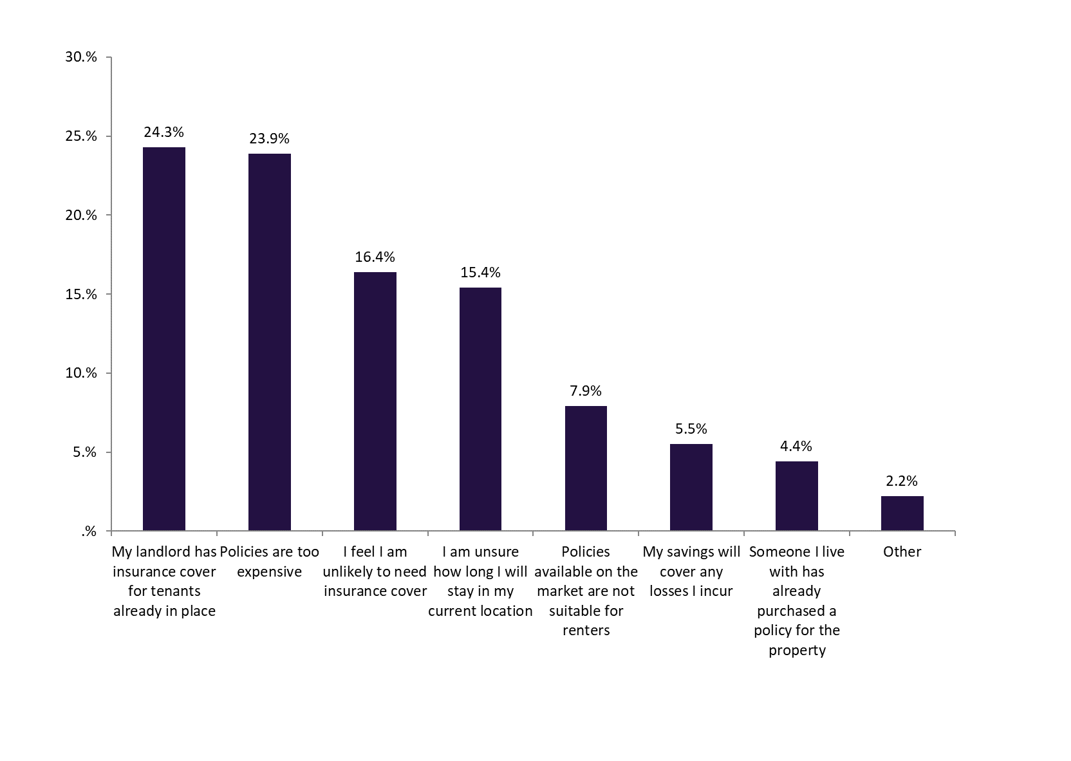GlobalData surveying reveals that the leading reason renters lack any form of home insurance is a belief that their landlord has insurance coverage for tenants already in place. Meanwhile, research from AA Insurance Services highlights that a quarter of renters do not have any form of home insurance.
As per GlobalData’s 2023 UK Insurance Consumer Survey, 24.3% of renters state that they have not purchased a home insurance policy because their landlord already has insurance cover for tenants in place. This is followed by reasons such as policies being too expensive (23.9%), they feel they are unlikely to need cover (16.4%), and uncertainty about how long they will stay in their current location (15.4%).
Many renters may mistakenly assume that their landlord’s insurance policy will cover their personal belongings and provide liability protection in the case of unforeseen events. However, landlord insurance typically only covers the building infrastructure and any furnishings owned by the landlord. This leaves tenants vulnerable to financial losses in the event of a claim.
It is crucial for renters to understand the limitations of their landlord’s insurance and the importance of having their own contents insurance in place. Without their own insurance policy, renters may be left vulnerable in situations such as water leaks, theft, and other events that could result in damage to or loss of their personal belongings.
Meanwhile, a survey by AA Insurance Services found that 26% of private tenants said they did not have any form of insurance in place. Additionally, AA’s survey also found that 23% of social renters do not have any form of home insurance. In contrast, just one in 100 homeowners do not have any form of home insurance, while 92% have buildings and contents insurance.
Against this backdrop, it is essential for renters to be informed about the distinction between landlord insurance and renters’ insurance. This would not only provide peace of mind for renters but also ensure they are adequately covered in the event of unexpected circumstances. Insurers can help tenants by offering renters’ insurance policies tailored to their needs. These policies typically cover personal property, liability protection, and additional living expenses if the rental becomes uninhabitable due to a covered loss. Insurers can also educate tenants about the importance of having their own insurance coverage, providing peace of mind and financial security.
How well do you really know your competitors?
Access the most comprehensive Company Profiles on the market, powered by GlobalData. Save hours of research. Gain competitive edge.

Thank you!
Your download email will arrive shortly
Not ready to buy yet? Download a free sample
We are confident about the unique quality of our Company Profiles. However, we want you to make the most beneficial decision for your business, so we offer a free sample that you can download by submitting the below form
By GlobalDataMoreover, insurers can tackle the affordability problem cited by 23.9% of renters by offering flexible payment plans or by providing options for excess and coverage levels, allowing renters to customise their policies to align with their financial constraints while still ensuring adequate protection. By tailoring policies and providing flexible payment options, insurers can make renters’ insurance more accessible and affordable for those in need of protection. Going forward, insurers can play a pivotal role in educating renters about the importance of home insurance while simultaneously supporting them by developing customizable policies tailored to their needs and budgets.








